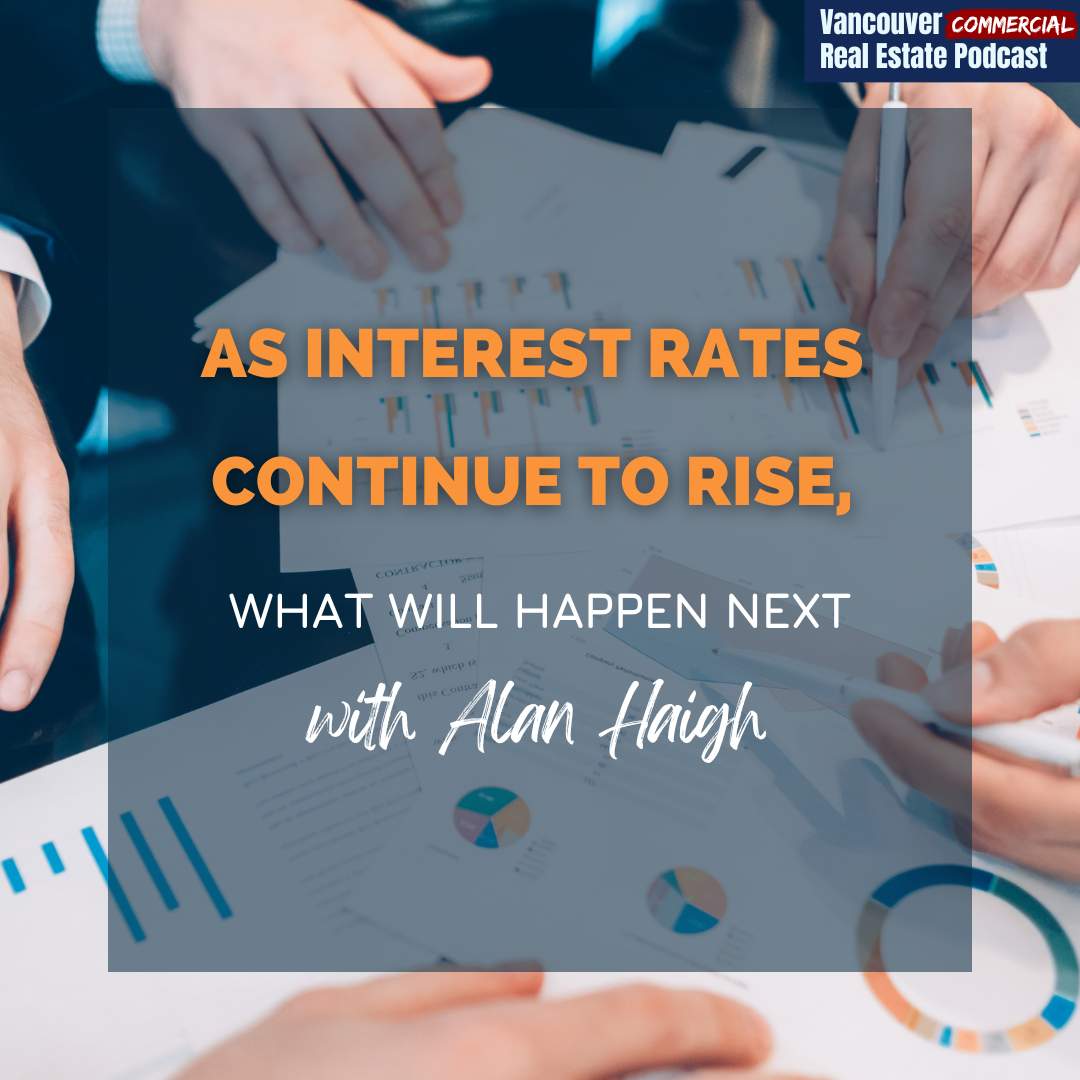
Powered by RedCircle
The VCREP community has spoken and they want to know what will happen next as interest rates continue to rise. VCREP is a podcast for the people, and who better to bring back to see what's around the corner than Impact Commercial's very own Co-founder and Managing Partner, Alan Haigh!
Alan unpacks what has happened over the past couple of months in both Canada and the US, how the bond market could predict what will happen to interest rates, and when this madness will end. Alan also unveils what markets he buys into and what markets you'll want to keep an eye on into 2023. One of the best in the business provides his insight on interest rates and what's next in the mortgage world, so this is an episode you have to listen to more than once!
Who is Alan Haigh?
I’m the managing partner of Impact Commercial. Outside of work, I love playing hockey and I have three kids. At Impact, we’re looking to help our clients as a niche commercial mortgage shop.
What is happening with interest rates right now?
I’m not an economist but we like to be in the market as the market happens; we’re in the data right now. The unpredictability and the speed at which interest rates have increased has been unbelievable.
The volume is not down but what we’re doing is changing. We’re still working a lot of multi-family and industrial deals, but not as much in construction. That’s one of my specialties, but the cost of financing the construction of a property has tripled in the last year. Inflation, supply chain issues and rising interest rates have caused projects to slow or be postponed.
Investment property purchases have also slowed. People are having to put a lot more down to be able to purchase and so many are taking a pause.
Let’s talk loan to value ratios. How does a mortgage change when interest rates go up?
There are different variables that go into a mortgage calculation. On the commercial side, it’s the income of the property that supports the mortgage payment, not the income of the buyer.
So if you have a cap rate of 5% with a 3% interest rate, you have a 2% spread. But if interest rates jump up to 6%, you have an inversion. So you’ll qualify for a lower mortgage amount because more of that property’s income needs to support the mortgage.
In the past, we could do a 75% leverage with a 3% rate. Now we’re lucky to get to 45-50% leverage. That’s causing the slow down.
You also want to ask what kind of assets do well during times of high inflation and high interest rates. Commercial real estate is still one of the best options as they’re not making more land. Our most successful clients are still buying strategically, even if they have to put more down, because they know they’ll be okay in 10-20+ years.
Have the recent rate increases changed how you do deals?
100%. We’re seeing a lot more alternative financing now that interest rates have risen. Alternative lenders are not your big banks but they’re smart lenders who understand what’s happening and can still provide attractive bridge financing options.
We are recommending all of our clients do a 1-2 year variable mortgage. Demand is going down and the banks are predicting a decrease in the policy rate next year. If rates drop next year, why commit to five years at 6-7%?
Are banks changing their lending requirements due to the rising interest rates?
Absolutely. And it’s not just the banks. Lenders want to know what will happen if interest rates jump up to 10%. How will a buyer handle that?
Banks have to plan for the downside and ensure no systemic risk gets into the economy. It puts a pinch on borrowers but we understand why they’re doing it. Bottom line, you have to put in more equity now.
What will the next Bank of Canada interest rate change look like?
I think we’re going to have another 50 basis point increase in October. I thought we’d see inflation cool more than we have so far. After that, I think we’ll see another hike of about 25 basis points, for a total of 75-100 basis points before we go into a holding pattern. Which we think will lead into a bit of a recession next year.
All things being equal, that should cause a reduction in interest rates by the middle of 2023.
What areas do you like to invest in?
We’ve always focused on real estate in a few key areas, such as the Interior of BC. It’s amazing every time I go up there. It’s really becoming a self-sufficient area. Gone are the days when Kelowna was dependent on Alberta oil money.
I also look at Eastern Fraser Valley out by Mission and Langley. For people who want their house with the white picket fence, it’s more realistic out there. For businesses that need warehouses, they have to move out there for the space. It’s more affordable and people and businesses are moving there. We like those trends.
We also like the area around Victoria and Kamloops. We’re lucky in BC that we have multiple markets that are really good for investment.
Are you seeing changes in these areas of BC due to increasing interest rates?
Not really! Our busiest areas have been Vancouver, Kelowna and Victoria and they’ve all remained quite busy and consistent. More people are starting to look outside of the Lower Mainland, which is great.
Where do you think the real estate market will be by Q1 of 2023?
I think it will be a slower pace for the next 3-4 months. By February and March, I think we’ll see more real estate deals flowing. A lot of people are in a “wait and see” mode right now. That desire to buy has waned.
As soon as repricing starts on the land, we’ll see a lot more deals come on board. It always starts with the land. I’m certainly watching that market.
But this is just one guy’s opinion looking at the data points. I’m not an economist but we try to be more than just a regular brokerage at Impact.
What are the most resilient asset classes moving forward?
“Beds and sheds” are still the most robust and high demand assets. Multi-family and rental in BC is incredibly strong and so is industrial. BC is actually losing to Alberta when it comes to industrial because our supply is so limited.
The next most robust asset would be anything in a good location. Covered land plays have worked out well for our clients.
What advice do you have for someone looking to invest in commercial real estate as interest rates continue to rise?
The main thing is to build your team. It takes a team to be successful. You need a good realtor and a good commercial mortgage broker.
You have to understand the debt solution in commercial real estate. So reach out; don’t hesitate. Whether the process is lengthy or short, you can reach out today and get the conversation going.
Find out more: impactcommercial.ca
For all the curious minds interested in commercial real estate investing, grab a coffee and pull up a chair because we have exclusive stories and tips from commercial real estate brokers, investors, developers, economists, urban planners, and everyone in-between. From the successes and failures to the motivations and lessons learned, the Vancouver Commercial Real Estate Podcast is your insight into commercial real estate in Vancouver, Victoria, Kelowna, and beyond.
What's the best real estate market to invest in? What are the commercial real estate asset classes and property types? Hosted by Cory Wright, founder of William Wright Commercial, and co-hosts Adam and Matt Scalena of the Vancouver Real Estate Podcast, our podcast opens the door to real estate investing for everyone from beginner investors to experienced real estate professionals. New episodes are released every Tuesday. Follow the Vancouver Commercial Real Estate Podcast on Apple Podcasts, Spotify, Google Podcasts, or your favourite streaming platforms.

This communication is not intended to cause or induce breach of an existing agency agreement. E&OE: All information contained herein is from sources deemed reliable, and have no reason to doubt its accuracy; however, no guarantee or responsibility is assumed thereof, and it shall not form any part of future contracts. Properties are submitted subject to errors and omissions and all information should be carefully verified. All measurements quoted herein are approximate.
ⓒ William Wright Commercial Real Estate Services 2024
Proudly designed by Burst Creative